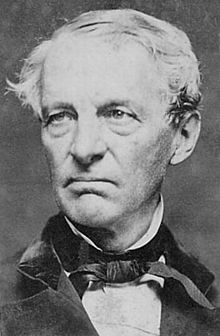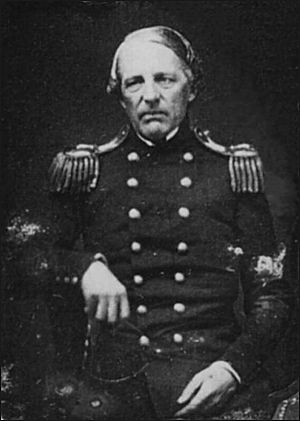Samuel Cooper (general) facts for kids
Quick facts for kids
Samuel Cooper
|
|
|---|---|
 |
|
| Born | June 12, 1798 New Hackensack, Dutchess County, New York |
| Died | December 3, 1876 (aged 78) Alexandria, Virginia |
| Place of burial |
Christ Church Cemetery, Alexandria, Virginia
|
| Allegiance | |
| Service/ |
|
| Years of service | 1815–1861 (USA) 1861–1865 (CSA) |
| Rank | |
| Commands held | Adjutant General and Inspector General |
| Battles/wars | Second Seminole War Mexican-American War American Civil War |
Samuel Cooper (born June 12, 1798 – died December 3, 1876) was an important military officer. He served in the United States Army for many years. Later, he became the highest-ranking Confederate general during the American Civil War. Even though he is not well-known today, his role was very significant. After the war, he lived as a farmer in Virginia.
Contents
Early Life and Military Career
Samuel Cooper was born in New Hackensack, Dutchess County, New York. His parents were Samuel and Mary Horton Cooper. When he was 15, in 1813, he joined the United States Military Academy. He finished his studies two years later.
After graduating, he became a brevet second lieutenant in the U.S. Light Artillery. He was promoted to first lieutenant in 1821 and to captain in 1836.
Family Connections and Early Roles
In 1827, Cooper married Sarah Maria Mason. This made him related to many important people. Her brother-in-law was James M. Mason, a future Confederate diplomat. Cooper's daughter later married Union General Frank Wheaton.
Cooper worked as an aide-de-camp for General Alexander Macomb from 1828 to 1836. During this time, he wrote a book about instructions for the military.
Cooper served in different artillery groups until 1837. Then, he became the chief clerk of the U.S. War Department. In 1838, he was promoted to major and became an assistant adjutant general. Nine years later, he became a lieutenant colonel.
Service in Wars
Cooper fought in the Second Seminole War from 1841 to 1842. This was a rare time he left Washington, D.C. He was the chief of staff for Colonel William J. Worth. After the war, he returned to his staff duties in Washington.
He was promoted to colonel in 1848 for his work during the Mexican-American War. In 1852, he became the Adjutant General of the U.S. Army. Cooper also briefly served as acting U.S. Secretary of War in 1857.
It is important to know that Samuel Cooper owned six slaves during the 1850 census.
Civil War Service
When the Civil War began, Cooper supported the Southern states. His wife's family was from Virginia, and he was good friends with Jefferson Davis. Davis had also been the U.S. Secretary of War.
One of Cooper's last actions in the U.S. Army was to sign an order dismissing General David E. Twiggs. Twiggs had given his command and supplies in Texas to the Confederacy. Cooper resigned from the U.S. Army six days later, on March 7, 1861. He then traveled to Montgomery, Alabama, which was the capital of the Confederacy at the time.
Joining the Confederacy
In Montgomery, Cooper was quickly made a brigadier general on March 16, 1861. He became both the Adjutant General and Inspector General of the Confederate Army. He held these important jobs until the war ended. Cooper used his many years of experience to help organize the new Confederate War Department.
On May 16, 1861, Cooper was promoted to full general in the Confederate Army. He was one of only five men to receive this rank at that time. He was also one of only seven during the entire war. Because of his early promotion, he outranked famous generals like Robert E. Lee. Cooper reported directly to Confederate President Jefferson Davis.
At the end of the war in 1865, Cooper surrendered. He was released on May 3 in Charlotte, North Carolina. During the war, Union forces destroyed his home near Washington, D.C. They used the bricks to build a fort called “Traitor’s Hill.”
Life After the War
Cooper's final official act was very important for history. He made sure that all the official records of the Confederate Army were saved. He then gave them to the United States government. These records became a key part of the Official Records of the American Civil War. Historians greatly appreciate Cooper for this action. It helped preserve a priceless part of history.
After the war, Cooper became a farmer at his home, Cameron, near Alexandria, Virginia. His house had been used as a fort by the U.S. government during the war. He moved into a smaller house on his property. Because of his age, Cooper did not earn much money. On August 4, 1870, Robert E. Lee and other former Confederates sent Cooper $300 to help him.
Samuel Cooper died at his home in 1876. He is buried in Alexandria's Christ Church Episcopal Cemetery.
Images for kids
See also
 In Spanish: Samuel Cooper (general) para niños
In Spanish: Samuel Cooper (general) para niños
 | John T. Biggers |
 | Thomas Blackshear |
 | Mark Bradford |
 | Beverly Buchanan |



